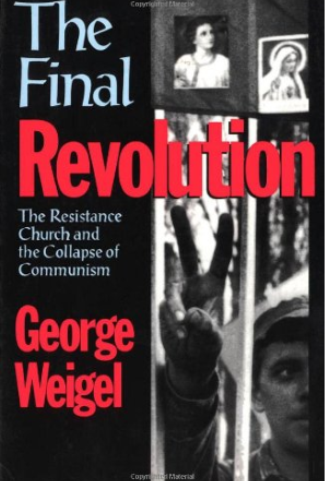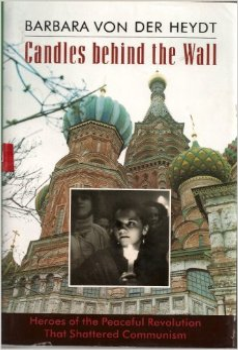Retrospective: Books about the fall of communism in Europe
Weigel, G. (1992) The Final Revolution: The Resistance Church and the Collapse of Communism, Oxford: OUP
The story of how the Church helped catalyse the revolution of 1989 in Central Europe by preaching a revolution of conscience, a revolution of the human spirit is told in this book. While many factors played in the collapse of communism, especially in Poland and Czechoslovakia, Weigel argues that the Roman Catholic Church and the Pope were indispensable to what became the Revolution of 1989. The book explores the relationship of democracy to religion, placing the process of communism’s collapse in a larger moral context. Weigel rejects arguments that Communism's collapse was due primarily to individuals like Gorbachev or Reagan, or to the Helsinki human rights process or economic failure. The Communist heresy essentially was its claim of human omniscience and omnipotence.
The fall of Communism signified the end of an era of utopian ideology, and resolved the moral and spiritual conflict between democracy and its totalitarian negation. Hence the title "the final revolution" as Weigel uses the term.
The election of a Polish Pope, John Paul II, on October 16, 1978 marked the beginning of the end of Communism in Poland and in the rest of Eastern Europe. For John Paul II came to his new position not content to contain Communism but with a desire to assault its legitimacy, expose its bankruptcy, and ultimately to isolate it and assure its demise.
Von der Heydt, B. (1994) Candles Behind the Wall: Heroes of the Peaceful Revolution that Shattered Communism, Grand Rapids: Eerdmans Publishing
Based on more than 150 personal interviews with people from Poland, Hungary, East Germany, Russia, Czechoslovakia, and Romania, Candles Behind the Wall is a gripping account told by people who lived behind the Iron Curtain. Their courage changed the course of history, bringing down a repressive regime with a resounding crash.
Thousands of ordinary but heroic people sparked a moral, spiritual, and political revolution in Eastern Europe and the Soviet Union through their courage and convictions, leading to the collapse of Communism.
What gave a young woman the courage to walk up to one of the tanks surrounding the Russian parliament building in the attempted coup of 1991, bang insistently on its side and tell the driver the Bible forbade killing? What gave 70,000 unarmed people the courage to go onto the streets of Leipzig and face down troops under orders to shoot them?
International television correspondent Barbara von der Heydt (Elliott) was based in West Germany prior to the fall of the Wall and witnessed one of the most remarkable chapters of modern history. She launched a private initiative to care for the refugees fleeing communism. Retracing their trails to the countries they had fled, she discovered a moral and spiritual revolution that preceded the political one, a revolution of the heart and mind that began at least a decade before the fall of the Berlin Wall.


